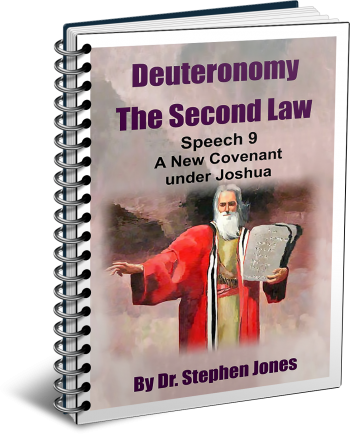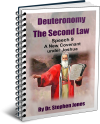Latest Posts
View the latest posts in an easy-to-read list format, with filtering options.

A commentary on the ninth speech of Moses in Deuteronomy 29-31. The book of Deuteronomy is a series of 12 speeches that Moses gave just before his death at the end of Israel's wilderness journey.
Category - Bible Commentaries

Moses’ final speech concluded in Deut. 31:13 with his admonition about keeping Tabernacles. From then on we read a more historical and prophetic narrative, where he appoints Joshua to succeed him, followed by two prophetic songs that Moses wrote. Our study of Moses’ speeches is now complete. The rest of Deuteronomy primarily focuses upon historical events and how they prophesy of the future.
Moses’ first speech was a history of Israel’s exodus from Egypt to the Promised Land. It was also a prophecy of church history from the first to the second coming of Christ. In speeches two through eight Moses taught the law of God to the people, culminating with the New Covenant in speech nine.
It is fitting, then, that the law should lead us to Joshua’s commission, especially because the final speech set forth the New Covenant. Joshua (Yeshua in Hebrew) was a type of Christ under the New Covenant, even as Moses was a type of Christ under the Old. We see, then, that the way Deuteronomy was recorded, the study of the law climaxed with the New Covenant and led directly to Joshua’s commission.
Paul remarks about this in Gal. 3:24, saying, “Therefore the Law has become our tutor to lead us to Christ.” We too have now finished our tutorial of the law, and we find that the law leads us to Joshua—that is, to Yeshua, or Jesus.
Yeshua is the Mediator of that New Covenant. Because the people were unable to fulfill their own vow in the Exodus covenant, God created a second covenant by vowing to do what the people had failed to do. Hence, Yeshua is called to implement the oath of God and to ensure its success. Deuteronomy 31:14 says,
14 Then the Lord said to Moses, “Behold, the time for you to die is near; call Joshua, and present yourselves at the tent of meeting, that I may commission him.” So Moses and Joshua went and presented themselves at the tent of meeting.
We are given no details about this commission, other than that it was done at the tent of meeting where the Ark was kept. However, when we see its parallel in the New Testament, when Jesus was commissioned by John at the time of His baptism, we may gain insight into the ceremony by which Joshua was commissioned. It suggests that Moses baptized Joshua at the laver in front of the tabernacle, which at that time was not far from the Jordan River.
In the New Testament we read that Jesus presented Himself to John the Baptist for baptism, I believe, on the Day of Atonement. This was a direct parallel to Joshua’s commission at the tabernacle, even though John baptized Jesus at the Jordan River.
In my view John was the one that God recognized as the high priest, even though King Herod had appointed another to preside in the temple. We know that John was of a priestly family, for his father, Zacharias, had been ministering in the temple when he received revelation about the birth of John (Luke 1:5). John, then, was the last priest of Levi and Aaron recognized by God. When he died childless, the high priestly mantle passed to Jesus, his nearest relative, even though Jesus was of the tribe of Judah.
This transfer shifted the legitimate priesthood from the Levitical order to the Melchizedek Order, where one’s tribe and genealogy has no relevance (Heb. 7:12-14).
John was essentially a rival high priest, whether he knew it or not. The temple was being ruled by a high priest that was called by men and not by God. So John left the temple and baptized at the Jordan River instead of at the laver.
When Jesus came to John for baptism, it fulfilled the prophetic parallel found in Deut. 31:14, where Moses and Joshua were told to present themselves at the tent of meeting, that is, at the tent which housed the Ark of the Covenant, where the presence of God resided at the time. In the time of John, however, the Ark had long ago disappeared with Jeremiah when the Babylonians destroyed the temple. The rebuilt temple in Jerusalem did not have the Ark of God’s presence, as God intended to indwell Jesus Christ and to make all of us into temples of God (1 Cor. 3:16).
And so when Jesus presented Himself to John for baptism, the presence of God was with them. John represented Moses, and Jesus represented Joshua. This was how the prophecy in Deut. 31:14 was fulfilled in accordance with the new circumstances. By recognizing this parallel, we may extrapolate that Moses baptized Joshua as a prophetic pattern for the day when John baptized Jesus (Yeshua).
Deut. 31:15 then says,
15 And the Lord appeared in the tent in a pillar of cloud, and the pillar of cloud stood at the doorway of the tent.
It seems that the pillar of cloud normally hovered over the Most Holy Place, directly above the Ark of the Covenant. Hence, it moved twenty cubits over the Holy Place and “stood at the doorway of the tent.” This was where Moses and Joshua were standing, for the laver in the outer court stood just outside the doorway of the tabernacle.
When we see the New Covenant counterpart to this event, the Spirit of God hovered over Jesus in the form of a dove, rather than a cloud. Yet the same voice spoke the great words of commission, saying, “This is My beloved Son, in whom I am well pleased” (Matt. 3:17). Were these words spoken also over Joshua? We are not told. Perhaps this detail was omitted from the record in Deuteronomy in order to prevent men from thinking that Joshua was more than a prophetic type.
When Moses and Joshua presented themselves in Deuteronomy 31, the record gives only a prophecy of Israel’s apostasy that would bring about divine judgment. This suggests that the same apostasy seen in ancient Israel would manifest again in the nation in the time of Jesus Christ, for we know that He was rejected as the Messiah, bringing divine judgment upon Jerusalem forty years later.
Deut. 31:16 says,
16 And the Lord said to Moses, “Behold, you are about to lie down with your fathers; and this people will arise and play the harlot with the strange gods of the land, into the midst of which they are going, and will forsake Me and break My covenant which I have made with them.”
The covenant in question is the Old Covenant, or the Exodus covenant, wherein the people had vowed to be obedient. Since Moses was about to die, this prophesied of Israel’s apostasy during their time in Canaan. Since Joshua urged them to keep their vow to God, it is apparent that the people disobeyed the voice of Joshua as well as Moses.
In the New Testament we find that Yeshua-Jesus was also rejected, along with His message.
In the New Testament, John represented Moses when he baptized Jesus and commissioned Him for ministry. We read in Luke 16:16,
16 The Law and the Prophets were proclaimed until John; since then the gospel of the kingdom is preached, and everyone is forcing his way into it.
John’s ministry concluded the ministry of Moses, along with the Prophets who, as an extension of Moses’ ministry, interpreted and applied the law to Israel and the world. For this reason, once John had baptized Jesus, his ministry began to come to a close, even as Moses’ ministry began to end after he commissioned Joshua.
And so, if we may paraphrase the prophecy in Deut. 31:16 and reapply it to the New Testament setting, where John had taken the role of Moses, we might read it this way:
And the Lord said to John, “Behold, you are about to die at the hands of King Herod; and these people of Judah will play the role of a harlot and follow after other messiahs as we move into the New Covenant era. They will forsake Me and break the Old Covenant which I made with them.”
The Old Covenant era ended with John’s death, and a new era of Yeshua began. A new priesthood was instituted to minister under the New Covenant. But again, even as the people had rejected the word of Moses, so also would they reject the word of Joshua. Likewise, John was rejected and killed, and Jesus was treated in the same manner. This is why God spoke only of the people’s rebellion and apostasy during Joshua’s commission. Not only was it to warn Joshua of opposition ahead, but it was also to prophesy of Christ’s rejection.
Deut. 31:17, 18 continues,
17 Then My anger will be kindled against them in that day, and I will forsake them and hide My face from them, and they shall be consumed, and many evils and troubles shall come upon them; so that they will say in that day, “Is it not because our God is not among us, that these evils have come upon us?” 18 But I will surely hide My face in that day because of all the evil which they will do, for they will turn to other gods.
God did indeed judge Israel by many captivities during the time of the Judges. Finally, the great captivity of Assyria came upon Israel, when they were removed from the land and scattered among the nations (2 Kings 17:6, 18-20). A century later, Judah was also removed from the land and went to Babylon for seventy years. However, they returned so that Jesus might be born in Bethlehem, as Micah 5:2 had prophesied.
Judah’s scattering did not come until after the nation had rejected Jesus as the Christ. Nonetheless, the word of God to Moses and Joshua was fulfilled. God hid His face from them as well. They were “consumed,” and many evils and trouble came upon them. The purpose of such judgment was to make them recognize that their situation was “because our God is not among us.”
Both Israel and Judah had rejected God, and so His presence withdrew from them. The glory of God’s presence left the old temple in that land, and the only way to regain God’s presence is through Jesus Christ, who now indwells us as His temple.
Because of the rebellion of the people, which God foretold to Moses and Joshua, God inspired Moses to write a song and to teach it to Israel. This song would bear witness, not only to the problem that was to come, but also to the solution. Hence, this song is a prophecy of things to come.